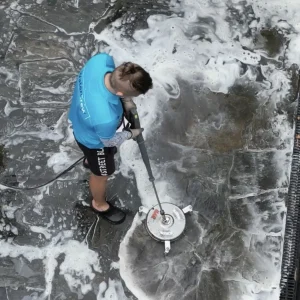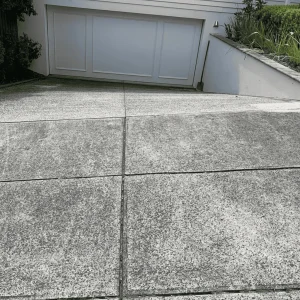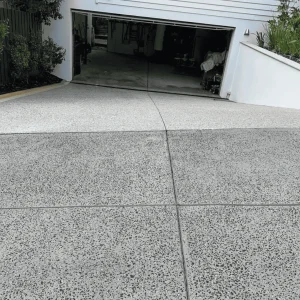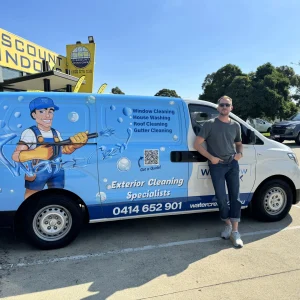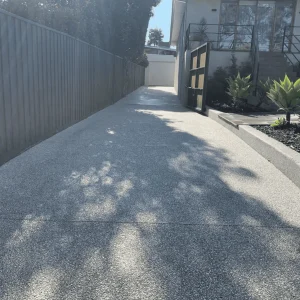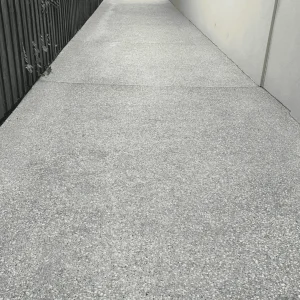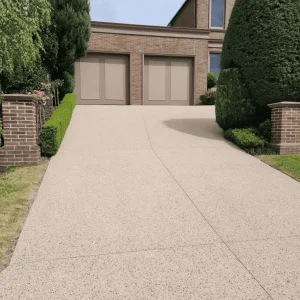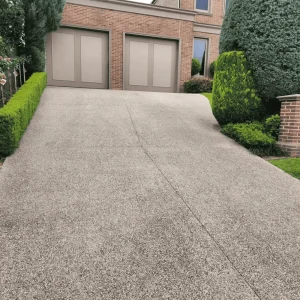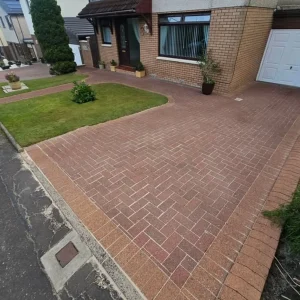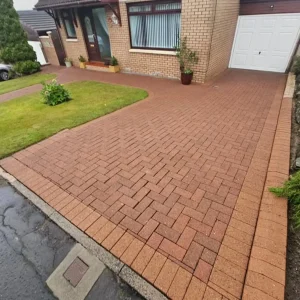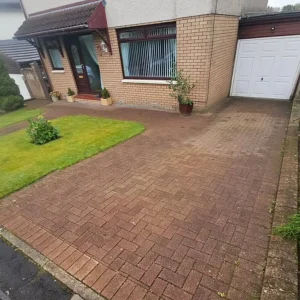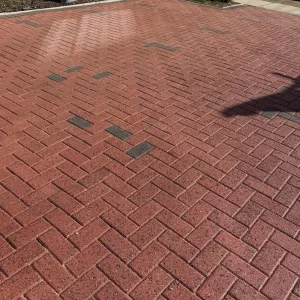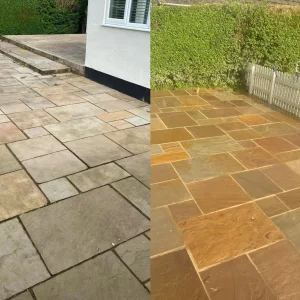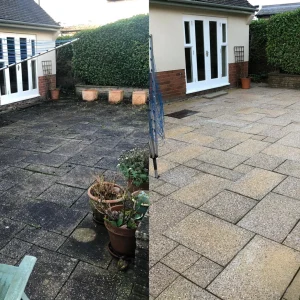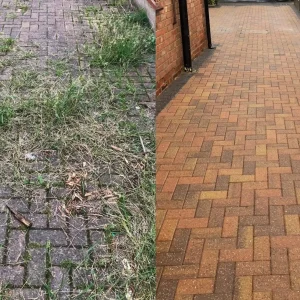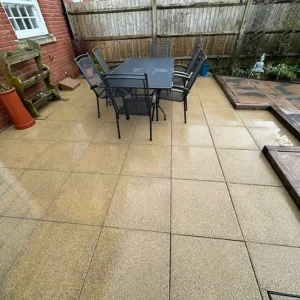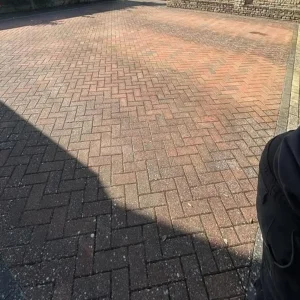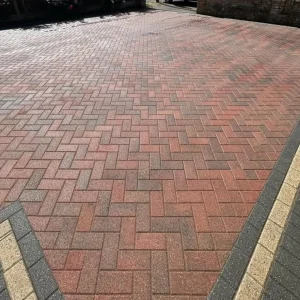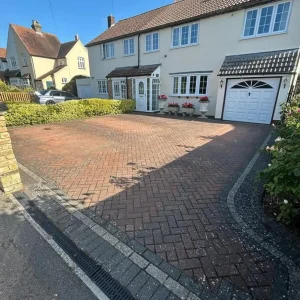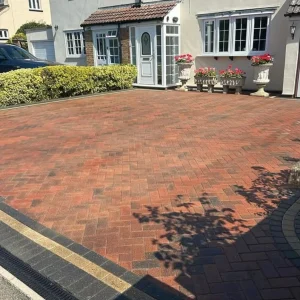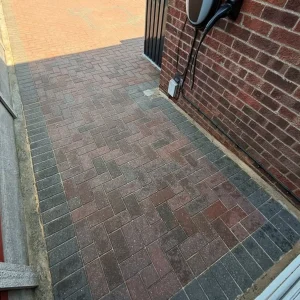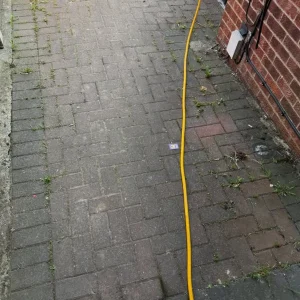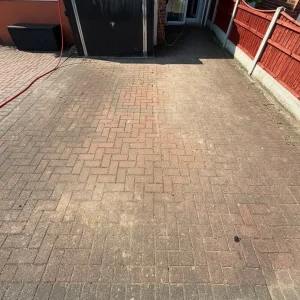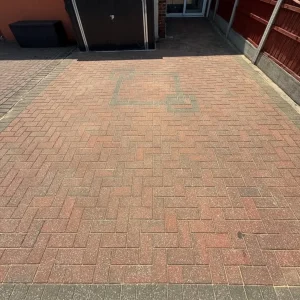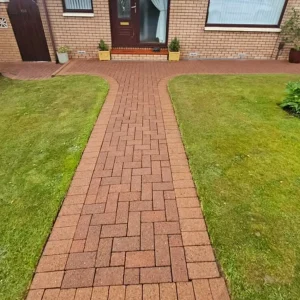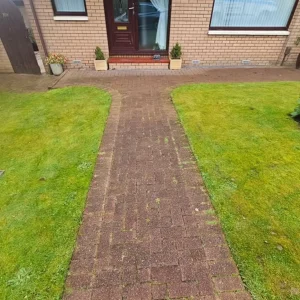Look, we get it- driveway cleaning isn’t exactly at the top of your weekend wishlist. But give it enough time, and it won’t just look rough around the edges; it’ll start causing real headaches. Moss, oil, mould, and red dirt don’t just stain your concrete or pavers—they make it slippery, eat into driveway surfaces, and can even void your home insurance if someone’s unlucky enough to slip.
We’ve seen it all: render lifted from overspray, driveways etched from DIY blasts with power washers, and tenants dodging bond returns because their concrete was closer to black than grey.
We wrote this guide to help you avoid those dramas. So grab a cup of tea, and let’s talk about stains, safety, and what your driveway really needs.
Mould, Moss or Mess?
You’d be surprised how many driveways we’ve cleaned where the owners thought it was just “a bit of dirt.” Nope. Try this list:
- Lichen and moss — especially in the cooler, damper climates of Tasmania, the Blue Mountains and parts of Melbourne’s east
- Oil stains — from parked utes, leaky lawnmowers or that one relative who still drives a ‘98 Commodore
- Algae and mould — common in Queensland during the wet and in shady spots anywhere
- Rust stains — from old furniture, garden edging or metal gates
- Tannin stains — from leaves, bark or mulch, especially near eucalypts
Each of these stubborn stains needs a different approach and just blasting it with high pressure isn’t always the fix.
The Truth About Pressure Washing for Driveway Cleaning
Let’s get one thing straight: pressure cleaning isn’t a one size fits all solution.
When pressure cleaning works:
- Concrete surfaces with minimal damage
- Removing loose dirt, algae or surface mould
- Prepping the driveway surface before sealing or painting
When it can cause damage:
- Exposed aggregate driveways — you can blast the stones right out
- Stencilled or painted concrete — you’ll strip the pattern faster than a Bondi southerly
- Brick pavers — especially if they’re already shifting or have loose grout
- Old or brittle concrete — it’ll crack like dry mud in the PilbaraWe’ve seen it all before where people have tried to DIY with a hired high pressure cleaner and ended up making a mess. If in doubt, test a small area first — or call the Driveway Cleaning team.
Gentle Cleaning, Smarter Results
Not every driveway needs to be blasted. Enter soft washing — a method that combines low pressure water with biodegradable detergents to break down grime.
We soft wash:
- On coloured concrete to avoid fading
- Old brick or natural stone that can’t handle pressure
- Around garden beds and garden walls where runoff matters (no one wants chemical-burnt camellias)
And yes, it still cuts through algae, mould and dirt — just with a gentler touch. Plus it stays cleaner for longer because we’re treating the source of the grime, not just the symptoms. It’s part of our broader exterior cleaning approach that keeps outdoor surfaces looking their best.
Cleaning Frequency
Here’s what we recommend:
Minimum:
- Once a year — ideally before winter in southern states to prevent moss and mould growth
Twice a year if:
- High rainfall or humid zones (hello QLD and northern NSW)
- Tree cover or leaf litter
- Rental or on the market — visual appeal matters
Quarterly if:
- Driveway sees a lot of vehicle traffic or trades
- Bore water staining causes constant issues
- Strata complex or commercial space management
Cleaning regularly means fewer headaches down the track — kind of like keeping up with your gardening tasks before the weeds win.
Cleaning regularly also makes the job easier and cheaper each time — it’s like brushing your teeth versus waiting for a root canal.
DIY Driveway Cleaning Tips
If you want to do it yourself, here’s what we’d tell a mate:
What you’ll need:
- A broom or blower to clear debris
- A good degreaser (we like ones with citrus oil for oil stains)
- Mild detergent or outdoor cleaner
- A garden hose or pressure cleaner (on low to medium setting)
- PPE — gloves, goggles, closed shoes
- A cleaning attachment if you’re using a pressure washer
Our go-to process:
- Sweep thoroughly
- Wet the area to loosen surface dirt
- Apply degreaser to any oil spots, let it dwell
- Apply detergent over the whole surface
- Gently scrub or use a low-pressure rinse
- Rinse well — don’t leave chemicals to dry.Don’t do it in the middle of the day — water will evaporate too quickly and leave streaks. And avoid bleach — unless you want a patchy driveway and dead grass.
What not to do (trust us, we’ve seen it all)
- Don’t use a turbo nozzle on pavers — it’ll eat them alive
- Don’t aim pressure at grout lines — that’s surface damage waiting to happen
- Don’t use household bleach — it’s too harsh and not eco-safe
- Don’t ignore runoff — it can flow into stormwater drains illegally
- Don’t mix chemicals unless you’re qualified — seriously, don’t be that person
One time in Brighton, a bloke mixed chlorine and acid trying to clean rust off his pebblecrete. Ended up with a driveway that looked like a crime scene and burnt holes in his lawn. We had to resurface the whole thing.
Our Favourite Cleaners
Worth your coin:
- Sodium percarbonate-based cleaners — eco-friendly and effective on mould/algae
- Citrus-based degreasers — cut through oil without nasty fumes
- pH-neutral detergents — safe for sealed concrete and gardens
Give these a miss:
- Cheap chlorine bleaches — bad for the planet and your surfaces
- Acid-heavy rust removers unless you’ve got experience
- Any cleaner without clear dilution instructions (too easy to overdo it)
We also recommend following up with chemical treatment or chemical sealing to protect against future stains — particularly on newer or decorative types of driveways.
Regional tips
VIC, NSW, ACT
- Clean before winter sets in — moss and algae thrive in the cold
- Watch for runoff rules — some councils fine for detergent entering drains
QLD, NT
- Time your cleans between wet season storms
- Watch for fast mould regrowth — soft wash helps slow it down
WA, SA
- Bore water staining is your biggest enemy — use a rust and mineral remover suited to your surface
- Consider sealing your driveway after cleaning to protect it from UV and salts
Cost
We get asked this all the time. Here’s a rough driveway cleaning price guide based on our experience:
- Small driveway (1 car space): $100–$200
- Medium driveway (2–3 car spaces): $200–$400
- Large or steep driveways: $400–$700+
Add-ons like chemical paving cleaning, stain removal or driveway sealing will add to the cost, as will combining with other extras like brick cleaning or retaining wall work.
Need help choosing the right team? Look for tradies with good gear, power washing experience and access to reviews. We’ve got some great reviews ourselves from happy customers across VIC and QLD.
Final word from the crew
Driveway cleaning isn’t just about looks — it’s about safety (slippery moss is a lawsuit waiting to happen), longevity and adding value to your place. Keeping your exterior surfaces clean makes a big difference.
If you’re time poor or not sure how to handle your surface, give us a yell. We’ve got the right gear, the right know how and a soft spot for making Aussie driveways look brand new — without wrecking what’s underneath.
We work with our mates at Window Cleaning Melbourne Crew too — so if your windows are as fogged up as your concrete, we can sort that while we’re there.
Got a weird stain? Send us a photo — we’ve probably scrubbed it before.

Your satisfaction is our top priority. We tailor our services to meet your specific needs

We are committed to environmental responsibility. Our cleaning products are eco-friendly.

Pricing
We offer competitive pricing without compromising on the quality of our services.

Expertise
As a locally owned and operated company, we understand the unique needs of our community.
FAQ
How often should I clean my driveway?
Depends on your postcode and the weather tantrums it throws. In Melbourne? Plan for at least twice a year — spring and after winter. If you’re in the tropics or battling bush dust, you might need quarterly touch-ups. Grime builds faster than magpies in mating season.
Is pressure washing safe for all outdoor surfaces?
Short answer: nope. We’ve seen folks blast their paint clean off or send pavers into orbit. High pressure’s great for hardy concrete but a big no-no on things like sealed render, soft stone or dodgy grout lines. That’s where soft washing comes in — low pressure, high smarts.
What’s the green slime on my concrete or tiles?
That’s mould, algae or lichen — all loving your damp, shady spots. Not just ugly, but slippery too. Left alone, it can dig in deep and damage porous surfaces. A proper clean with the right solution (not just a quick hose-down) sorts it out without wrecking your finish.
Can I just use bleach and a broom?
You can, but should you? Not really. Bleach can discolour tiles, corrode grout, kill your garden and leave residue that attracts more dirt. Plus, it’s a pain for the nose and lungs. We recommend targeted cleaners that lift bio-growth without the chemical chaos.
What’s the cost of a professional clean — am I getting ripped off?
In Melbourne, expect anywhere from $150 to $600+ depending on surface size, material, access and level of gunk. If someone’s quoting $99 for the whole job, they’re either cutting corners or upselling on the day. Ask what’s included. We always scope and quote upfront — no surprises.

